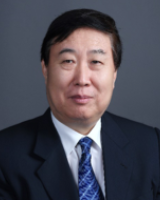Academician of the Chinese Academy of Sciences (CAS), Foreign Member of the American Academy of Arts and Sciences, and Fellow of The World Academy of Sciences (TWAS). As
a geographer and landscape ecologist, he is the Director of CAS Research Center for Eco- Environmental Sciences and the Head of the Faculty of Geographical Science, Beijing Normal University. He has been granted the Second Prize of the National Natural Science Award, the Outstanding Contribution Award of International Association for Landscape Ecology, and the Second Prize of National Science and Technology Progress Award. He is currently the Vice President of International Geographical Union and a member of the National Expert Committee on Eco-Environmental Protection.
Topic: Improving Public Science Literacy for the Realization of Sustainable Development Goals
Abstract
Focusing on sustainable development goals, advances in sustainable development research and the promotion of public science literacy for the realization of sustainable development goals,this speech will introduce the Sustainable Development Goals (SGDs) and the advances in the latest research frontiers. The UN SDGs exhibit four salient features: 1) expansion of constitutors to make it a global initiative; 2) expansion of targets to cover all UN member states; 3) upgrade of development concepts to establish a three-in-one concept of sustainable development underpinned by economic development, social progress and environmental improvement; and4) proper correction of omissions and deficiencies. This speech will also give introduction to the major developments in sustainable development research and the specific challenges facing SDGs. Firstly, compared with the Millennium Development Goals (MDGs), SDGs highlight the support needed from the scientific community. Secondly, the 2018 Sustainability Development Goals Report has pointed out that it is not possible to realize the SDGs by 2030 according to current progress. Thirdly, insufficient capabilities in data monitoring, statistics and simulation have become major constraints. Fourthly, climate change and the associated droughts and other natural disasters have given rise to additional challenges. Fifthly, there entails a systematic and comprehensive approach to realize the interrelated SDGs. The speaker proposes a "classification- coordination-collaboration" framework. In order to give full play to the critical role of science and technology in realizing SDGs, the speaker calls to value the sustainable innovation in science and technology and to establish a science and technology governance system that servesSDGs, including to reach a consensus on the values of sustainable development, to establisha coordination mechanism at the level of International Science Council, and to improve the science and technology governance structure among governments, enterprises, institutions, universities, social organizations and the international community. In the meantime, we should comprehensively strengthen the technology partnerships between enterprises, regions and countries by: 1) jointly building a platform for innovation and collaboration; 2) assuring the funding for innovation and collaboration; 3) jointly fostering international talents; and 4) further pushing ahead the education and promotion of sustainable development.
